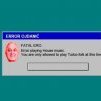Search the Community
Showing results for tags 'android'.
Found 168 results
-

Memorizor and Kastri showcase:, local notification permission
Rollo62 posted a topic in Cross-platform
Hi there, I'm sure most of you were aware of @Dave Nottage and his very helpful (live-saving) Kastri(Free) projects. Now with the presentation of the Memorizer, there are certain discussions about issues in the cross-platform world. Same as Dave I try to postpone permission requests to the bitter end, just before touching the hardware. For camera, sensors, etc. thats usually no issue. The problems may start when using local notifications, or related permissions, like Bluetooth and location. The local notifications permissions are fired right at startup, and thats annoying. You can imagine if you need a few permissions at startup, then they all will appear, and the user has to click them away before showing any useful screen. But for local notifications permission this might be maybe the right way too, because in mobile you also can run in foreground or background. So I would like to discuss the possibilities and pros and cons we have, for the permission settings from a users point-of-view. 1. Ask permission right after startup (as is now) - this is annoying to the user, especially if several requests appear one after the other - works in all cases, also for background mode, as it forces the user to decide - its a little like the old "Android way", permit all before use anything, but Androids style has changed meanwhile (for good reasons) - sometimes the app runs in background, and has no other chance to notify, than by local notification So the local notification permission shall be given at startup, to ensure this works. 2. Ask permission short before usage (in foreground) - thats what I like too, users shall decide each function before they use it. - but when moving to background w/o giving permission before, this might fail. A user cannot give permission while in background mode, the function simply fail or crash. 3. Ask permission short before going to background - this is not possible, because the app cannot do much when changing the states, especially no long-lasting alerts. 4. Allow permission in a special setup dialog - This is the "windows" setup philosophy, I think very much out of fashion in mobile: Force the user to visit setup first. - This will solve the issue in 2.), but I really try to to avoid this forcing of "setup" style design. Are there any other ideas or use-cases ? So far I think 1.) (as is) has its need too, and its not easy to cover all use-cases with one solution in mobile, there are too many options. Beside that, Android and iOS might have different philosophies as well, howto get them all under one umbrella ? -

gallery Android 10 delphi 10.4 camera and gallery doesn't work
Massimiliano S posted a topic in Cross-platform
Hi, After updating to delphi 10.4 and SDK 29 the camera and gallery do not work on Android 10 Also delphi examples don't work. After taking a photo from the camera the app doesn't return anything while the gallery, after choosing the photo, raises this execption First chance exception at $ 00000074D87D473C. Exception class EBitmapLoadingFailed with message 'Loading bitmap failed (/data/user/0/com.embarcadero.CameraRoll/cache/IMG_20200911_1728082355078942815963051.jpg).'. Process CameraRoll.apk (11714) any ideas? -

createdirectory 10.4 firemonkey 10.4 failed to create folder on android
PavelX posted a topic in FMX
Hi, I try to run the following code on Android (10.4 Sydney) fn:=TPath.Combine(TPath.GetSharedDocumentsPath(),'OLA'); TDirectory.CreateDirectory(fn); // or ForceDirectories(fn) -> I tried both functions if TDirectory.Exists(fn,false) then showmessage('Ok') else showmessage('Failed'); And the code fail. The same code works without any problem with 10.3.3 (using the same phone) Note: On both environments I have used default User Permissions. including "Write external storage" Did you encountered this problem? - how did you solved? Thank you in advance, Pavel -

What ScriptEngine to choose ? DwScript, PascalScript, FastScript, TmsScripter, HtmlScripter
Rollo62 posted a topic in FMX
Hi there, I'm looking for a scripting engine in my projects, and since I had last time contact with scripting this is some years ago. I would like to check out the pros and cons of the solutions, to find the best fitting match for me. Since paxCompiler seems gone by Apex, this is maybe out of sight now, but I'm not so sure about that. DwScript is not available on mobile, as far as I know. DwScript is somewhat available in different forks (so it seems), not sure which one is the right one to choose. Maybe the list of engines is nit final, please let me know if there is something missing. What I'm looking for is a script engine that has the following features (I've put the most important in bold) usage for some base analysis and event control lightweight very stable well supported and documented Pascal supporting multiple languages would perfect, but not a main criteria (JS, C++, C#, Basic) Multiple platforms Win, Macos, Linux, iOS, Android is a must have supporting full language support is nice to have, but not a must (I can skip the special stuff I would say). performance (not that critical, but should be able to process dynamic protocols behaviour reasonable well ) memory footprint good, active community Free to use in commercial products I hope you can bring some light in this dark forest of possibilities, and share some experiences. -
Few months ago I prepared small demo application used FireDAC SQLite connection on an Android system. And it worked fine in an application built in Delphi 10.3. Then I updated Delphi to 10.4. And now I got: Project xxx.apk raised exception class ESQLiteNativeException with message ''. and after that: [FireDAC][Phys][SQLite] ERROR: no such table: items. Even table 'items' exists in the database file and I did not any changes in sources. Anyone had the same issue?
-
i am using Delphi 10.3.3, and i develop app for Android with local language fonts (Sinhala Sri Lankan Language), same font i can see in my mobile no issue, but when use the same font for my app fonts shows weird, for your reference i am attaching 2 screenshot with the app and same text with my mail phone and the fonts i use. and i already add to the deployment, and given the path .\assets\internal as well still the problem same, if you can help me i relay appreciate, since i am not professional developer still i am just learner, Noto Sans Sinhala.ttf
-

[Fmx, Rx10.4 Patch 3] Anybody working productively with this patch ?
Rollo62 posted a topic in Cross-platform
Hi there, are you able to work with yor projects on Patch 3 on mobile (Android, iOS) ? I've tried a while, but then moved back to Patch 2, which works more or less on Android with API-level 29. That was my main goal why I ported my apps to Patch 3. What are your experiences with that patch on different platforms ? -
Hi I'm using Delphi 10.3.3. I have a problem with TLabels on Android. There are horizontal or vertical lines on some letters in the TLabel. As you can see on the attached image, the "d", "y" and "A" of the label "Cloudy Apple Juice" have lines on them. So do the "h", "O", "u", "c" and "e" of the label "Fresh Orange Juice". I'm using Java JDK version 1.8.0_261. I don't know if this has anything to do with it, but lately I had to uninstall the JDK (of which I don't remember what the version was) and reinstall it (version 1.80._261). Has anyone encountered this before? And what is the default version installed by Delphi 10.3.3.
-
Hi I'm using Delphi 10.3.3. I have a problem with TLabels on Android. There are horizontal or vertical lines on some letters in the TLabel. As you can see on the attached image, the "d", "y" and "A" of the label "Cloudy Apple Juice" have lines on them. So do the "h", "O", "u", "c" and "e" of the label "Fresh Orange Juice". I'm using Java JDK version 1.8.0_261. I don't know if this has anything to do with it, but lately I had to uninstall the JDK (of which I don't remember what the version was) and reinstall it (version 1.80._261). Has anyone encountered this before?
-
hello All: . May i know please the right way to work with custom fonts inside android.?i have Patch this unit here: (FMX.FontGlyphs.Android), but no effect....i know that Alcinoe controls are native device controls and the paint in fmx android is ( FPaint: JPaint; )please guide me and if there is any demo or sample will be more helpful..i have watch in youtube how can do that in android studio and i follow the same steps but the controls didn't change their font as i expected ...i deploy a folder inside the res remote path named as (font) an inside that folder i deploy two xml files( attr.xml and myfont_familly.xml) and also deploy my fonts there ..after that i go to my custom styles.xml and i add this line here:<item name="android:fontFamily">@font/myfont_familly</item>but when i compile to run in android no effect happen ???please any reply will be so usefull SMS Read-Write.rar
-
How limit to one instance on android, windows, linux and mac ? There is any cross platform code? Thank you in advance. Pavel
-
Is there a way to stop the automatic pop up / pop down of the android virtual keyboard? (So I can do it manually when I want it.) The application has a tMemo which provides information to the user. As there is not much room on a small android, it requires scrolling up and down at times. At these times the bloody keyboard comes up and gets right in the way!
-

TThread.Sleep in iOS/android background mode threads, what to choose ?
Rollo62 posted a topic in Cross-platform
Hi there, I'm checking in iOS (and later for Android, Windows, etc.), what is the best, right way to Sleep in a background mode of the OS. The implementation for iOS seems to be same, as Posix, for iOS, Android, Macos, but I didn't checked that. My goal is to stop any OS operation in the background mode, to avoid killed apps by the OS. While the Thead loop is still active, but only throttled. TThread.Sleep - uses usleep, which is external function, as far as I know based on nanosleep - is this really affecting the current thread only ? class procedure TThread.Sleep(Timeout: Integer); begin {$IF Defined(MSWINDOWS)} Winapi.Windows.Sleep(Timeout); {$ELSEIF Defined(POSIX)} usleep(Timeout * 1000); {$ENDIF POSIX} end; System.SysUtils.Sleep - is bascially same {$IFDEF MSWINDOWS} procedure Sleep; external kernel32 name 'Sleep'; stdcall; {$ENDIF MSWINDOWS} {$IFDEF POSIX} procedure Sleep(milliseconds: Cardinal); begin usleep(milliseconds * 1000); // usleep is in microseconds end; {$ENDIF POSIX} System.SyncObjs.TEvent.WaitFor - is defintively based differently - uses a sem_timedwait (here and here also) - this probably waits by counting in a semaphore, so its not a "real" sleep of the OS, right ? Shall I better use Sleep or TEvent.WaitFor, to let threads sleep in the OS, while avoiding too many wakeups and operations in the background ? Is TEvent.WaitFor really sleeping, from a iOS OS perspective, or will it be seen as running app ? What I assumed before is that TThread.Sleep really stops the thread, and passes back CPU operation to other tasks, but I'm not so sure anymore under IOS. -
I was able to use Firemonkey to develop a multi-platform game, specifically for Android at first. After thoroughly debugging the app when running in Windows, I then deployed it in my Android tablet, and there were several problems, especially with regard to drag-and-drop, plus images that would remain on the screen when they should have disappeared. These problems were intermittent -- difficult to re-produce reliably. Nevertheless, I spent many hours trying every little trick I could think of in terms of structuring the code (e.g. different ways of trying to make a glyph disappear), but still could not get the functionality to where it needed to be. I was using Android 32-bit - Android SDK 25.2.5. Again, this app would run consistently and perfectly when running the Windows version! Unfortunately, I'll have to give up on this project unless someone has a bright idea.
- 5 replies
-
- delphi 10.3.3
- multi-platform
-
(and 1 more)
Tagged with:
-
Hello, I was developing a mobile application for my school, I were using Delphi Rad Studio Rio 10.3. Here is brief description what application is doing: in some editboxes user adds data -> proceed to next tab On second tab user is choosing video that he wants to preview, while video is playing he is clicking some buttons to mark duration of some activities on video that he loaded ... After that i am making a PDF report and saving to storage. I made whole application and it is working great, problem is that I used this library for slowing down video preview -> https://github.com/Zeus64/alcinoe i had some issues with this library ( most of them were configuration issues ) but at the end I managed to resolve all of them and make my app. So why I used this library? Answer is that it had option to set speed preview of video. Before I started using this library i was trying for a few days to implement this -> https://stackoverflow.com/questions/18526336/playback-video-in-slow-motion-in-android check answer from " karanatwal.github.io " Problem was that I didnt know how to rewrite this android code into delphi FMX code : videoview = (VideoView)findViewById(R.id.videoview); videoview.setVideoURI("Your Video URI"); videoview.setOnPreparedListener(new MediaPlayer.OnPreparedListener() { @Override public void onPrepared(MediaPlayer mp) { //works only from api 23 PlaybackParams myPlayBackParams = new PlaybackParams(); myPlayBackParams.setSpeed(0.5f); //here set speed eg. 0.5 for slow 2 for fast mode mp.setPlaybackParams(myPlayBackParams); videoview.start();//start your video. } }); So now I would like to rebuild my application and exclude this " alcinoe " library cuz I use it only for setting playback speed.. Can somebody help me rewriting this to a delphi code ? Thank you EDIT: I will later post code snippet of how i retrieve path of video and how i load it, code is not that great because it was one of my first projects but maybe it will help someone who reads this.
-
I developed an application using Delphi Firemonkey for managing my own commercial complex. I have named it EasyTenant. Overall development experience is good, though not excellent. Development was really faster because of the RAD nature. Third party components are limited for Android Firemonkey. GUI is average, not rich like other languages like Swift, Java, etc. Delphi lovers please give your feedback by looking at the screenshots. UX for me is okay not excellent.
- 18 replies
-
- android
- firemonkey
-
(and 1 more)
Tagged with:
-

[Android, 32-Bit, Debug] Projekt raised exception class Bus error (10)
Rollo62 posted a topic in Cross-platform
Hi there, I've got a strange exception, only with Android 32-Bit during Debugging, other platforms including IOS work well. With iOS 64 I had no issue seen, but wouldn't count on it right now. I use a TDateTime variable, and want to compare against NULL.. Since TDateTime is a Double with 8 Bytes, a simple cast to Double( Self ) should make not any harm. Maybe there are special conditions on Android, as Extended is reduced to Double, and maybe there are some conversion side effects with Double as well ? I use a class helper for adding such functionality, which is used in a million other places too. function TDateTime_Helper.ToDouble : Double; begin Result := Double( Self ); // Here it crashes, see images enclosed, they only have 2 ARM assembler lines end; and I already extended my conversion routing to separated local variables: // global variable for storage, only reading var LUNull : TDateTime = TDateTime( 0.0 ); class function TDateTime_Helper.Create_Null : TDateTime; begin Result := LUNull; // Could the global variable cause issues in a Thread ? Buts its readonly. end; function TDateTime_Helper.IsNull : Boolean; var LSelf : Double; LNull : Double; begin LSelf := Self.ToDouble; //11.03.20 added local variables, to check Android crash LNull := Create_Null.ToDouble; if SameValue( LSelf, LNull ) then Result := True else Result := False; end; I check a variable, which is called in a thread if FLastUpdate.IsNull then // called like this begin .... end I must confess that I use above scheme in many thousands of places, also heavily within threads (even higher loded), without an error before. The caller can be debugged very reliable, and the error is very reproducable When the caller comes in first, second, third time, with zero, all is fine When the caller comes in with a real Double value, I can debug and see a valid double value in the watch (e.g. FLastUpdate = 43901.1603147338 ) Inside the conversion ToDouble it crashes When entering with Zero, it looks like the images img. 1 and 2 (see the registers changing) When entering with Date, it looks like img. 3, and immediately it crashes at img. 4 What could cause such error, it sounds a little like failure of JNI Bus, but maybe I'M totally on the wrong track ? Probably there is some genius with a good hint how to fix this nasty bug. -
As in different old topics written, it is still not possible to have a android service with a tfdconnection or a tsqlconnection on it. The service is not starting any more, you use this. Here's a link: https://forums.embarcadero.com/thread.jspa?threadID=229761 But what can we do? Is there a known solution? I'm not able to find one. Have tried to create all components in service's code but still, i don't even get a log entry that means the service still can't be created and the app hangs on trying to start the service. Anone out there who can give some tips?
-

rio tInAppPurchase: "IabResult: IAB gab keine purchaseData oder dataSignature zurück (response: Unbekannter Fehler)"
microtronx posted a topic in FMX
We've implemented InAppPurchases, it works but if the user buyes a 12 months subscription on finsih i get this error is returned in "OnError" as tFailureKind.Purchase: IabResult: IAB gab keine purchaseData oder dataSignature zurück (response: Unbekannter Fehler) But Google says purchase is successful. I see the subscription activated. If i do a InAppPurchase.QueryProducts the product is listed as activated. Is someone using this with Rio and working? Is there any other component available than the integrated from embc. Such a base-function should work out of the box but does not. -

Anyone compiled Android apps (api 16) for Industrial devices with Android 4.1.x
microtronx posted a topic in Cross-platform
Hi, i know that Rio does not support below API16 but we have some older apps for industrial devices we need to update them. They were programmed with Tokyo with a lot of problems and i want to test them with Rio. Rio is installed on a new VM so i want to know if someone has get it work to compile apps for api level 16 / android 4.1.1 with Rio. -
Hello, I am using Delphi 10.3.3, targeting Android 64Bit and 32Bit. Attached is a test project I used. If that same project is compiled for Android 32Bit it gets two permission request as can be seen in below pictures However, if same code without changing anything is compiled for Android 64Bit it only asks for a single permission as can be seen in below picture Both bitness apk files are tested on same physical phone running Android 9. I have tried to change order of permissions in request to see if this is related with request order. I always get same above permission asked on 64bit version. Let me know if you think this is a bug in Delphi, please. Thanks & regards, Ertan Android64Bit_Permisions.7z
-

Support for 64-bit Android App Development in EntityDAC
Jordan Sanders posted a topic in Delphi Third-Party
Devart, the leading provider of database management software, connectivity solutions and developer tools, released the new version of EntityDAC 2.3, a Delphi ORM framework for fast object-relational mapping of database objects to Delphi classes using LINQ. The key update in this release is support for 64-bit Android app development, following the release of RAD Studio 10.3.3 that includes a new Delphi compiler for the ARM platform. In RAD Studio 10.3.3, you can build Google Play Store ready Android 64-bit applications, complete with Android App Bundle Support — the official publishing format for Android apps. The new version of EntityDAC will come in handy since, starting August 1, 2019, apps published on Google Play need to support Android devices with 64-bit architectures, which means publishers are required to provide 64-bit versions in addition to 32-bit versions. The trial editions of EntityDAC for macOS and Linux are fully functional: the vendor removed the limitation on the number of ORM metatypes that users can create with the trial version of EntityDAC on these platforms. To learn more about the recent release, visit — https://blog.devart.com/entitydac-now-supports-android-64-bit.html. About Devart Devart is one of the leading developers of database tools and administration software, ALM solutions, data providers for various database servers, data integration and backup solutions. The company also implements Web and Mobile development projects. For additional information about Devart, visit https://www.devart.com/ -

Why i can't use TDSRestConnection in Rio and Android Service ... not starting any more
microtronx posted a topic in FMX
Hi Folks, i'm new to Android Services world but have successful created my first app with a background-service (used demo of Kastrifree / CrossPlatformLocation) as base. It works good, but as soon i add a tfdconnection for a local sqlite table or a TDSRestConnection for connecting to a remote-server in the service-module it does not start. My question is: What are the limits of a android-service-module created with Delphi Rio? What is blocking the service from starting if we add one of those components? -

Segmentation fault while trying to receive UDP broadcast messages on Android
ertank posted a topic in Indy
Hello, I am using Delphi 10.3.3, Indy 10.6.2.5366 (stock Indy version) I am trying to listen broadcast UDP messages on Android (exact version I am testing is 4.4.2, I need to support latest versions, too) connected to a local WiFi. Broadcast messages will be sent in same network. I have found this page https://stackoverflow.com/questions/19040674/delphi-xe5-tidudpserver-does-not-receive-anything-on-android and tried to do it as to my understanding. Project has CHANGE_WIFI_MULTICAST_STATE permission set. UDP server parameters are as following at design time and everything else is left as default: TIdUDPServer.Active = False TIdUDPServer.BroadcastEnable = True TIdUDPServer.DefaultPort = 8080 I have following code where timer is activated as last line in OnFormCreate() event and has 0.5 seconds delay: procedure TForm3.tmrCheckPhoneServiceTimer(Sender: TObject); var WifiManagerObj: JObject; begin // Run just once tmrCheckPhoneService.Enabled := False; // Get necessary OS settings to receive broadcast messages Log('Getting multicast lock...'); WifiManagerObj := TAndroidHelper.Context.getSystemService(TJContext.JavaClass.WIFI_SERVICE); FWifiManager := TJWifiManager.Wrap((WifiManagerObj as ILocalObject).GetObjectID); FMulticastLock := FWifiManager.createMulticastLock(StringToJString('LightFactory Remote')); FMulticastLock.setReferenceCounted(True); FMulticastLock.acquire(); // Try to open a port on Android by sending a broadcast message Log('Sending a broadcast message...'); IdUDPServer1.Broadcast('test', IdUDPServer1.DefaultPort); // Now we can start to listen Log('Activating UDP listener...'); IdUDPServer1.Active := True; if FPhoneDialerService = nil then begin TDialogService.ShowMessage('PhoneDialer service not supported'); Exit(); end; PermissionsService.RequestPermissions([FCallPhonePermission], MakePhoneCallPermissionRequestResult, DisplayRationale); end; I have following code in my OnDestroy() event: procedure TForm3.FormDestroy(Sender: TObject); begin // Stop listenning. IdUDPServer1.Active := False; // Release multicast lock FMulticastLock.release(); end; My broadcast listening code is as following: procedure TForm3.IdUDPServer1UDPRead(AThread: TIdUDPListenerThread; const AData: TIdBytes; ABinding: TIdSocketHandle); var Data: string; begin Data := TEncoding.Default.GetString(AData); TThread.Queue(nil, procedure begin Log('Incoming broadcast message from: ' + ABinding.PeerIP) end); if SameText(Data, 'mytriggerphrase') then begin TThread.Queue(nil, procedure begin TestConnection(ABinding.PeerIP) end); end; end; After I run the app, I have following in my log: 2020-01-14 00:59:33.697 Getting multicast lock... 2020-01-14 00:59:33.736 Sending a broadcast message... 2020-01-14 00:59:33.740 Activating UDP listener... 2020-01-14 00:59:33.804 Incoming broadcast message from: 192.168.1.186 That IP number in above log belongs to Android device itself. I have following problems that I could not figure a solution: 1- I do not get any other broadcast message from my PC application which is sending one broadcast message each second. Is there anything I am doing wrong for that to happen? 2- I get segmentation fault (11) when closing my app. Detailed call stack and exact line is in attached picture. This happens each and every close. I did not understand why. Lastly, I am not sure if my code is doing it correct to keep multicast lock thru all run-time. I read a suggestion to release a multicast lock once finished with it in order to save battery life. So, I wonder if I can release multicast lock right after enabling my TIdUDPServer? Any help is appreciated. Thanks & regards, Ertan -
Hello, Using Delphi 10.3.3. I have no problem compiling Android apps. I just needed to use a service to test something and I failed to compile. Below is error message I receive on a new Android Service project: [Exec Error] The command ""\bin\javac" -d "C:\Users\Ertan\Documents\Embarcadero\Studio\Projects\JavaClasses\Project2" -Xlint:deprecation -classpath "C:\Users\Public\Documents\Embarcadero\Studio\20.0\CatalogRepository\AndroidSDK-2525_20.0.36039.7899\platforms\android-26\android.jar";"c:\program files (x86)\embarcadero\studio\20.0\lib\Android\Debug\android-support-v4.jar";"c:\program files (x86)\embarcadero\studio\20.0\lib\Android\Debug\fmx.jar" -bootclasspath "C:\Users\Public\Documents\Embarcadero\Studio\20.0\CatalogRepository\AndroidSDK-2525_20.0.36039.7899\platforms\android-26\android.jar" -encoding UTF-8 -target 1.6 -g -source 1.6 .\Android\Debug\Project2.java .\Android\Debug\Project2ProxyInterface.java" exited with code 3. I have no problem running javac on command prompt C:\Users\Ertan>javac Usage: javac <options> <source files> where possible options include: -g Generate all debugging info -g:none Generate no debugging info -g:{lines,vars,source} Generate only some debugging info -nowarn Generate no warnings -verbose Output messages about what the compiler is doing -deprecation Output source locations where deprecated APIs are used -classpath <path> Specify where to find user class files and annotation processors -cp <path> Specify where to find user class files and annotation processors -sourcepath <path> Specify where to find input source files -bootclasspath <path> Override location of bootstrap class files -extdirs <dirs> Override location of installed extensions -endorseddirs <dirs> Override location of endorsed standards path -proc:{none,only} Control whether annotation processing and/or compilation is done. -processor <class1>[,<class2>,<class3>...] Names of the annotation processors to run; bypasses default discovery process -processorpath <path> Specify where to find annotation processors -parameters Generate metadata for reflection on method parameters -d <directory> Specify where to place generated class files -s <directory> Specify where to place generated source files -h <directory> Specify where to place generated native header files -implicit:{none,class} Specify whether or not to generate class files for implicitly referenced files -encoding <encoding> Specify character encoding used by source files -source <release> Provide source compatibility with specified release -target <release> Generate class files for specific VM version -profile <profile> Check that API used is available in the specified profile -version Version information -help Print a synopsis of standard options -Akey[=value] Options to pass to annotation processors -X Print a synopsis of nonstandard options -J<flag> Pass <flag> directly to the runtime system -Werror Terminate compilation if warnings occur @<filename> Read options and filenames from file C:\Users\Ertan> My version of "javac.exe" is located at C:\Program Files\Java\jdk1.8.0_60\bin\javac.exe I have seen some people having exact same error on my searches. No solution that I could find so far. I am planning to setup a virtual machine to install fresh copy of Delphi 10.3.3 and test if working on it. Before I do that I wonder if there is something I need to check. Thanks & regards, Ertan
![Delphi-PRAXiS [en]](https://en.delphipraxis.net/uploads/monthly_2018_12/logo.png.be76d93fcd709295cb24de51900e5888.png)







